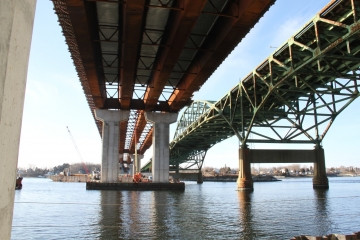Gencarella: TOLLS - Trucks Today, Cars Tomorrow.
Thursday, November 26, 2015
We all know it. The public has not one ounce of trust left when it comes to government. Just look at the flip flops. At first the General Assembly placed a toll on the Sakonnet, then (fortunately) they removed it. At first Speaker Mattiello supported the PawSox deal, then (fortunately) he didn’t. At first the Speaker didn't see the need for more oversight hearings on 38 Studios, then he did (although he still doesn’t see the need for what is really needed - an independent investigation). At first the Governor promised a thorough investigation of 38 Studios and now, not so much.
How Can We Be So Sure?
So when the Governor or the General Assembly tells you the toll will forever only be on trucks, do you really believe that? Have gas taxes and auto fees only been used for road and bridge maintenance? Is the 911 telephone surcharge only for 911 services? Are lottery proceeds for education? Were taxpayers free from the obligation to pay 38 Studios?
GET THE LATEST BREAKING NEWS HERE -- SIGN UP FOR GOLOCAL FREE DAILY EBLASTWe need to be realistic about the concept of spending tens of millions of dollars and dotting the RI roadways with the capability of creating mega ATM machines that can literally tax anything that moves in front of it. Of course cars will be tolled tomorrow! Our government is dead set against prioritizing the spending of your tax dollars and living within its means so there simply must be another dependable source of revenue.
As a matter of fact, the Governor is so intent on finding other ways in which to take your money she is proposing it in an Executive order. Are you aware that Governor Raimondo issued Executive Order 15-06 (see Item #7) that includes authority for the Lt. Governor to ‘explore opportunities to enable municipalities to diversify their sources of revenue beyond property taxes and motor vehicle taxes”? How’s that for new streams of revenue? In RI, the hunt for the ultimate revenue spigot is unending. But we digress.
Back To the Issue.
When the Governor first hatched the toll scheme, she thought it was a good plan bringing in over $100 million in toll revenue a year, costing $350 million in interest and paying off the associated debt in 15 years. So how is it that she believes it is a good plan now that it is projected to bring in less toll revenue ($60 million) while costing us significantly more ($580 million in interest) and the debt won’t be paid until 30 years from the date its issued?
At What Point Does A Good Plan Cease Being A Good Plan?
Speaking of good plans, do you think it is a good plan to give more than $500 million worth of projects to the RI DOT - the same DOT that has been deemed ‘dysfunctional and unaccountable’? We are talking about the same DOT that is requesting a mid year infusion, adding $25 million to their current annual operating budget of $463 million. There must be some formula that determines when a good plan is no longer a good plan.
And, as if we needed one, here’s another reason to be suspect of the plan. The Governor refuses to release the location of these tolling gantries. Where will they be? Exactly how many will there be? Would you be upset if they put one in your area, on a road you traveled daily? Of course you would, because you know that ultimately it won’t be just trucks that will be tolled. And you should know that John Simmons from RI Public Expenditure Council (RIPEC) testified that the toll legislation allows the DOT to toll 140 bridges on RI’s roadways! Any concerns there?
More Costs or Less Costs? More Work or Less Work?
The Republican Policy group has found so many holes in the plan that it should be cause for great concern to the general public. The most egregious problem with the Governor’s plan is that it spends $410 million more than the Republican plan and puts $255 million less into road and bridge repair. The bulk of this combined difference of over $600 million is the interest that Raimondo wants to fork over to Wall Street, and, of course, the cost of erecting and maintaining the gantries. When the plans are juxtaposed, which one do you think is the better plan?
And following that line of thought, why would elected leaders conjure up a plan that confiscates more than half a billion dollars from the taxpayer and sends them out of state? More than ever, RI needs to stimulate its own economy, not someone else’s economy.
Will This Be RI’s Big Dig?
Consider our neighboring state of Massachusetts where their ‘Big Dig’ project purportedly cost more than the Hubble Space Telescope (and that’s adjusted for inflation). Given the history of the RI DOT, 10 years from now, what mega-cost project will they be comparing to the costs of the ‘RhodeWorks’ project? The RI Center for Freedom and Prosperity has its own proposal for what is likely to be RI’s largest infrastructure project to date. Their suggestion - outsource the DOT in a fashion similar to what Pennsylvania has done in a private/public partnership. They also suggest a pay-as-you-go approach and refer to their Spotlight On Spending to identify sources of funding. Perhaps a combination of the Republican Policy Group plan and the Center’s plan is in order.
All of these plans warrant serious discussion, debate and consideration by all of our elected leaders. Anything is better than what the Governor, and now apparently, the Speaker, are proposing - to create an open line into the vein of the taxpayer.
Pam Gencarella is a member of OSTPA, a taxpayer advocacy organization in Rhode Island.
Related Slideshow: 10 Biggest Questions Facing Truck Tolls in RI
Related Articles
- Pam Gencarella: Is the Pendulum Swinging Back Toward the Center?
- Pam Gencarella: Don’t Touch That Dial
- Pam Gencarella: Context Is What’s Needed - Part I
- Gencarella: RI Stands Apart From a World Where Change Is the Only Constant
- Pam Gencarella: Surprised, Bewildered, Shocked, Disappointed
- Pam Gencarella: It’s Easy to Vote for Santa
- Pam Gencarella: Why You Should Care About a Constitutional Convention
- Pam Gencarella: A Civics Lesson From the East Bay
- Pam Gencarella: A Race to the Top or Running in Circles?
- Pam Gencarella: RI Has Lost Cabin Pressure
- Pam Gencarella: Witness the Crowding Out of Public Services
- Pam Gencarella: What’s All the Fuss About RhodeMap RI? If You Like Your Municipality, Keep It
- Gencarella: What Side Are You On? Do Organizations & Consortium Members Really Support RhodeMap RI?
- Pam Gencarella: The Twilight Zone
- Gencarella: RI Firefighters: Public Servants, Hardly Indentured Servants
- Gencarella: Is RI On A Path To Socialized HealthCare?
- Gencarella: Rhode Island - The Rule of Lawlessness
- Gencarella: It’s Time to Brew Our Own Coffee and Cut Out the Coolattas
- Gencarella: Let’s Leave It A Local Issue
- Gencarella: A Drop In The Proverbial Ocean State Budget
- Gencarella: Are Local Governments Kidding Themselves?
- Pam Gencarella: Where Does Raimondo’s Vision Put Us in Five Years?
- Gencarella: Can We “Make it in RI?”
- Gencarella: Public Union Benefits Limit What Our Government Can Do For Taxpayers.
- Gencarella: Is There a Movement Afoot
























